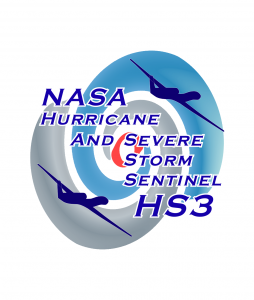
Hurricane and Severe Storm Sentinel
Close to 100 million Americans now live within 50 miles of a coastline, thus exposing them to the potential destruction caused by a landfalling hurricane. While hurricane track prediction has improved in recent decades, improvements in hurricane intensity prediction have lagged, primarily as a result of a poor understanding of the processes involved in storm intensity change. The Hurricane and Severe Storm Sentinel (HS3) was a five-year mission targeted to enhance our understanding of the processes that underlie hurricane intensity change in the Atlantic Ocean basin. HS3 determined the extent to which either the environment or processes internal to the storm are key to intensity change.
 The investigation objectives were achieved using two Global Hawk Uninhabited Aerial Systems (UAS) with separate comprehensive environmental and over-storm payloads. The high Global Hawk flight altitudes allowed overflights of most vertical storm convection and sampling of upper-tropospheric winds. Deployments from NASA’s Wallops Flight Facility and 30-hour flight durations provideds access to unrestricted air space, coverage of the entire Atlantic Ocean basin, and on-station times up to 10-24 hours depending on storm location. Deployments were from mid-August to mid-September 2012-2014, with ten 30-hour flights per deployment, providing an unprecedented and comprehensive data set for approximately nine to twelve hurricanes.
The investigation objectives were achieved using two Global Hawk Uninhabited Aerial Systems (UAS) with separate comprehensive environmental and over-storm payloads. The high Global Hawk flight altitudes allowed overflights of most vertical storm convection and sampling of upper-tropospheric winds. Deployments from NASA’s Wallops Flight Facility and 30-hour flight durations provideds access to unrestricted air space, coverage of the entire Atlantic Ocean basin, and on-station times up to 10-24 hours depending on storm location. Deployments were from mid-August to mid-September 2012-2014, with ten 30-hour flights per deployment, providing an unprecedented and comprehensive data set for approximately nine to twelve hurricanes.
HS3 was focused on the fundamental NASA Earth Science goal to "Study Earth from space to advance scientific understanding and meet societal needs" and NASA's Research Objective to "enable improved predictive capability for weather and extreme weather events." HS3 complemented NASA's Weather Focus Area and Hurricane Science Research Program.
Principal Investigator: Scott Braun
NASA Goddard Space Flight Center, Greenbelt, MD
Project Manager: Marilyn Vasques
NASA Ames Research Center, Moffett Field, CA
Mission Manager: Anthony Guillory
Langley Research Center (LaRC), Hampton, VA
